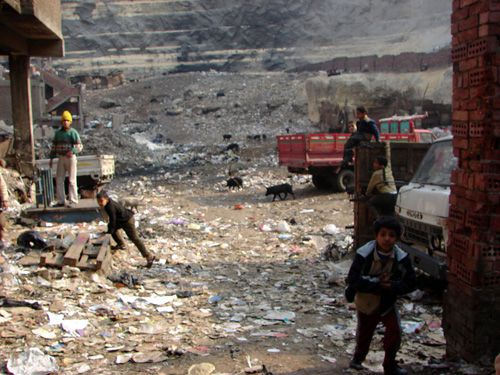
Rizk Youssef sits outside of a convenience store in Mokattam, the Garbage City of Cairo, while the community’s children jockey for space on his lap. He is dressed smartly. His low-pitched voice is calm; his English spiced with Arabic and French. A clinging stench, from generations of garbage collecting and swine herding, emanates from small hills of refuse, spills out from the alleys, oozes around all stationary structures. As Rizk begins to speak, darkness falls. The people of Mokattam venture out to socialize and a cool breeze lifts the scent of garbage away.
“I have taught almost all of these kids,” Rizk said, gesturing to the crowd of children gathering around him. “Their parents might have no education at all, but here I am teaching their kids English and French.”
Rizk symbolizes the vanguard of self-improvement, which, over the past 20 years, has swept through this community of garbage collectors (the zebaleen in Egyptian). His is the first generation to go to school, the first to graduate from university, the first to learn a foreign language and the first to venture out of the garbage industry. The children listening rapturously to his English represent a future that, for the first time in Mokattam’s history, is filled with possibility.
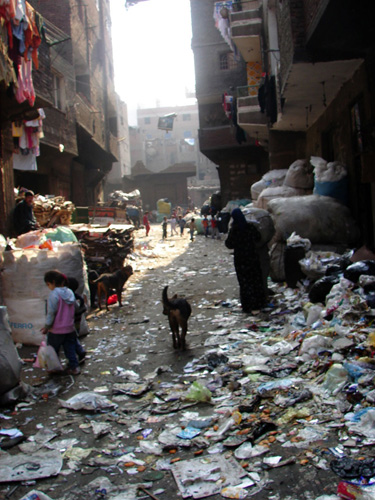
In the Beginning
The story of the zebaleen begins after the fall of the monarchy in 1952 when landless, illiterate Coptic Christians from the mostly rural southern province of Assiut migrated to Cairo with hopes of starting a new life. Rizk’s grandfather was among the original migrants to settle beneath the cliffs of Mokattam, near the center of old Cairo.
In overwhelmingly Muslim Egypt, Christians are tolerated, garbage collectors despised and pig farmers abhorred. The combination of all three kept the Zebaleen on the fringes of society.
For many of these peasants, including Rizk’s family, animal husbandry was the only means by which they could support their families, so they raised goats, donkeys and pigs in the courtyards of their squatter settlements. This quickly proved insufficient and soon the squatters found themselves in the employ of the Waahis, Bedouins from the oases of Egypt who had established themselves as middlemen for a wide variety of services in the city of Cairo. One of their lines of business was paper recycling. The peasants began collecting the garbage of the 12 million Cairanese and then sifting through it for paper, which they sold to the Waahis.
In overwhelmingly Muslim Egypt, Christians are tolerated, garbage collectors despised and pig farmers abhorred. The combination of all three kept the zebaleen on the fringes of society. Over the years, they became more and more insolated, adopting their own laws, religion and customs; education was minimal.
The Egyptian government largely ignored the zebaleen, content to have them rumble through Cairo’s streets in donkey carts and Toyota pick-ups making the garbage disappear. But in the mid 1970s, Bishop Samuel of the Coptic Orthodox Church took it upon himself to organize the zebaleen for community action, helping establish the Association of Garbage Collectors, a private voluntary organization comprised of local, secular and religious leaders.
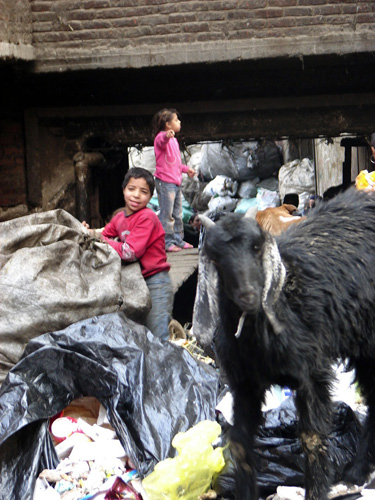
“The strong religious orientation of Egyptian culture made it natural that men of religion be the first ones to become involved in the lives of this marginalized community,” writes Laila Iskander in her book, Mokattam Garbage Village, a firsthand account of the wave of progress that brought the zebaleen out of the garbage pits and into university classrooms.
The association began by initiating basic services—burial of the dead, financial assistance in the form of alms, health care and day care for working women. And it eventually became a vehicle for funds from both governmental and non-governmental sources allotted to the zebaleen during the 1980s when international aid agreements and NGOs became de rigueur. That money was used to bring telephone, sewage and water systems to Mokattam, but most importantly, it was used to supply the zebaleen with compactors, crushers and grinders and the training to begin recycling the tin, aluminum and plastic refuse they had previously eschewed while collecting paper for the Waahis.
Education worked its way into zebaleen life. But most neighborhood patriarchs would rather have their sons scouring the city for recyclables and their daughters at home sorting out valuables.
Within a few short years, the zebaleen revolutionized the garbage industry and with it their own lives. Every family in Mokattam was engaged in the recycling business in some fashion. Men and boys went from neighborhood to neighborhood in Cairo, collecting the garbage in donkey carts and later in government-sanctioned pickup trucks and then hauling it back to Mokattam. Women and girls took over from there, sorting through the garbage for useful items. The men then crushed and sold the plastic, paper and cloth to factory owners, who churned out lollipop sticks, straws and pillows. They washed and ground down aluminum and tin for bottle caps and silverware.
By 1984, a compost plant created a circle of relationships that would have shocked the well-to-do of the city had they contemplated it: waste from the tables of the rich was collected and sorted by the zebaleen and fed to the pigs. The pig offal was then hauled away to the compost plant and sold as fertilizer to farmers further north in the Nile delta, the circle ended back upon the dining table as fruits and vegetables.
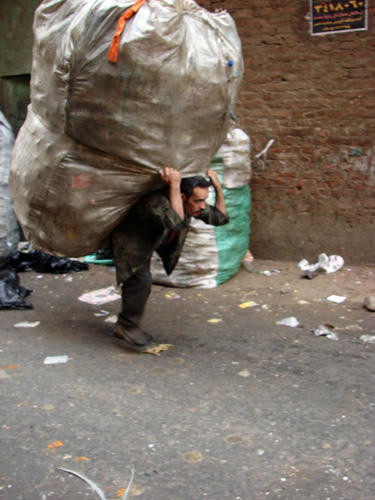
If you build it
The lives of the zebaleen had changed irreversibly: business was good and international exposure as well as visitors from abroad alerted the community to the opportunities the world has to offer. In 1991 the community used its newfound wealth to establish its first community school.
Rizk was one of the first zebaleen children to attend formal primary school. He excelled and went on to take the entrance exams for university, where he scored 90 percent in both English and French. His poor math and science skills, though, derailed his dream to enroll in the teacher’s college. Instead he went to law school, which seemed like a dead end at the time, with the community’s three lawyers busily operating aluminum smelters and plastic crushing machinery instead of reading law books.
University life introduced Rizk to a different world. For a traditional Coptic Christian growing up in Mokattam there are ironclad rules that govern most aspects of human behavior, especially between the sexes. Men and women live separate lives, marriages are arranged and the patriarch is the arbiter of All Under Heaven. Now he was meeting women in a free and relaxed setting. Despite the distraction, Rizk maintained his focus and raised his grades in math and science enough to gain entry to the teacher’s college, where he enrolled as an English major. He graduated from the English program in 2001 and from law school in 2004.
The neighborhood relied on Rizk and his classmates to keep their children interested in the outside world and in turn his worldliness and ability to converse with foreigners made him a celebrity and a role model.
And Rizk wasn’t the only one. Over the next decade education slowly worked its way into zebaleen life. But in spite of this, most neighborhood patriarchs still would rather have had their sons scouring the city for recyclables and their daughters at home sorting out valuables than have them in school.
“Our society is still pretty closed,” said Rizk. “Girls have a hard time leaving their homes and when everyone makes money recycling, it didn’t make sense to waste time with school.”
This attitude was forcibly changed by the privatization of waste management in 2003. That year, the Egyptian government made a deal with multinational waste management companies, which initiated a bidding war for rights to collect garbage in Cairo’s many districts—a bidding war, which the zebaleen could not participate in. The Cairo Cleaning and Beautification Authority, a local government body, negotiated with three waste management firms, two Spanish (FCC and Urbaser) and the Italian Ama Arab Environment Co. The deal gave the firms exclusive rights to collect and dispose of garbage, thereby cutting the zebaleen effectively out of the trash business.
Ironically, due to a government squeeze of finances, the firms ended up outsourcing to the capable zebaleen. But for much less than they had made before. Prior to when the multinational waste management companies came, a garbage collector could count on 500LE (about $88) per month from a neighborhood contract; now the zebaleen are working for as little as 80LE (about $14) per month.
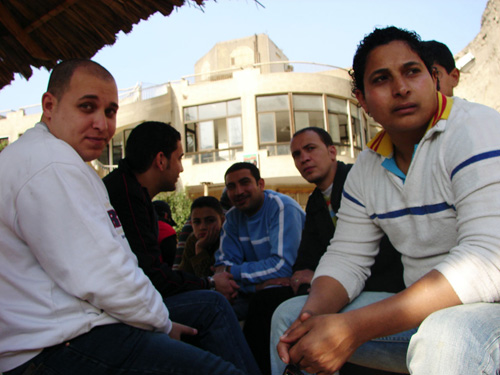
Education equals opportunity
Rizk was able to survive the onslaught of multinational waste management corporations because of his education and exposure to the outside world. While at university, Rizk maintained his recycling business and was a foreign language tutor for the community’s children. After graduating he continued to maintain his business and consult for his neighbors, he also got a job at a local NGO, the Wadi Environmental Science Center, and he translated for French and English aid workers who came to visit Mokattam. The neighborhood relied on him and his classmates to keep their children interested in the outside world and Rizk’s worldliness and ability to converse with foreigners made him a celebrity and a role model.
“Our ideas of education are getting better,” says Rizk, who believes that with increased competition and shrinking profits education is the only thing that will lift the community out of the landfill they are living in.
“But we are still stuck in the old patterns, the old corruption. It is a big problem, even though we have improved so much.”
“When I went to school there were seven of us who graduated and only one girl—now there are hundreds of kids and many of them are girls,” says Rizk.
The children who earlier could not stop squirming realize that he is speaking of their fate. They grow silent and draw even nearer to him. There is Antonio, whose English is the best, and Katrina, whose eyes betray her wisdom, although she is only 12. Both of these children attend school across the small plaza in front of the convenience store. Katrina also weaves rugs at another school facing the plaza, a school for girls only, that was established by the first Egyptian Association for the Protection of the Environment (APE).
The Rags to Rugs project is just one more example of efforts by the community to bring the children of Mokattam out of the garbage pits and into classrooms where they learn various skills including literacy. Supplied with rags and looms, cardboard for shipping, cargo space on air and truck lines, a van and a computer, design and marketing assistance, printing services and free medical services, the project teaches useful, profitable skills to the girls—ultimately generating more income and opportunity for the community as a whole.
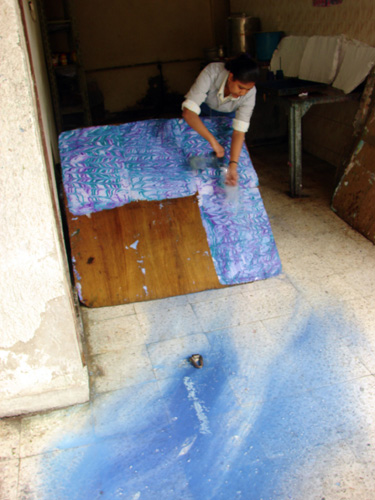
Required to arrive every day on time, with clean clothes and hair, the girls have been steered toward an identity far removed from the shameful status of a garbage collector. The girls dig into the piles of colorful rags with the same determination they show when sorting through garbage—they are expert sorters and relish the chance to practice the art devoid of dangerous materials, grime and stench.
The girls have sold their rugs across the planet. And now, the Rags to Rugs project also has a platoon of once-illiterate girls running a paper recycling plant out of the basement, where they manufacture greeting cards, CD cases and envelopes by hand, exporting them as far away as Michigan.
Almost every teacher of Rizk’s age, including Rizk himself, has passed through APE’s doors, translating for English and French tourists and donors, teaching the girls basic English and other subjects and learning from the various NGO personnel who pass in and out. These teachers are coming up with new ideas to help develop the area, such as a Recycling School for Boys to modernize the zebaleen’s main industry, a theatre troupe performing “The Story of 50 years Serving the Affluent Residents of Cairo” for universities around Egypt and corporate sponsored entrepreneurial workshops.
During their 50-year monopoly of the Cairo garbage business, the zebaleen managed to save a bit of cash—local Muslims declare that although the barons may live in squalor, they are far from poor. Now, these shrewd old men are investing their hard-won savings into tuition and training for the next generation. Today’s zebaleen study law, economics, politics, foreign languages—anything but waste management. Their parents may have turned garbage into gold, but they hope to spin gold into a future without garbage.
“These children are the future of our area, the future of Egypt,” he says. “When I went to school there were seven of us who graduated and only one girl—now there are hundreds of kids and many of them are girls. Now families are willing to pay 15,000LE (about $2650) for a child to go to a private pharmacy school.”
Sascha Matuszak is a freelance writer living in Chengdu, China.
